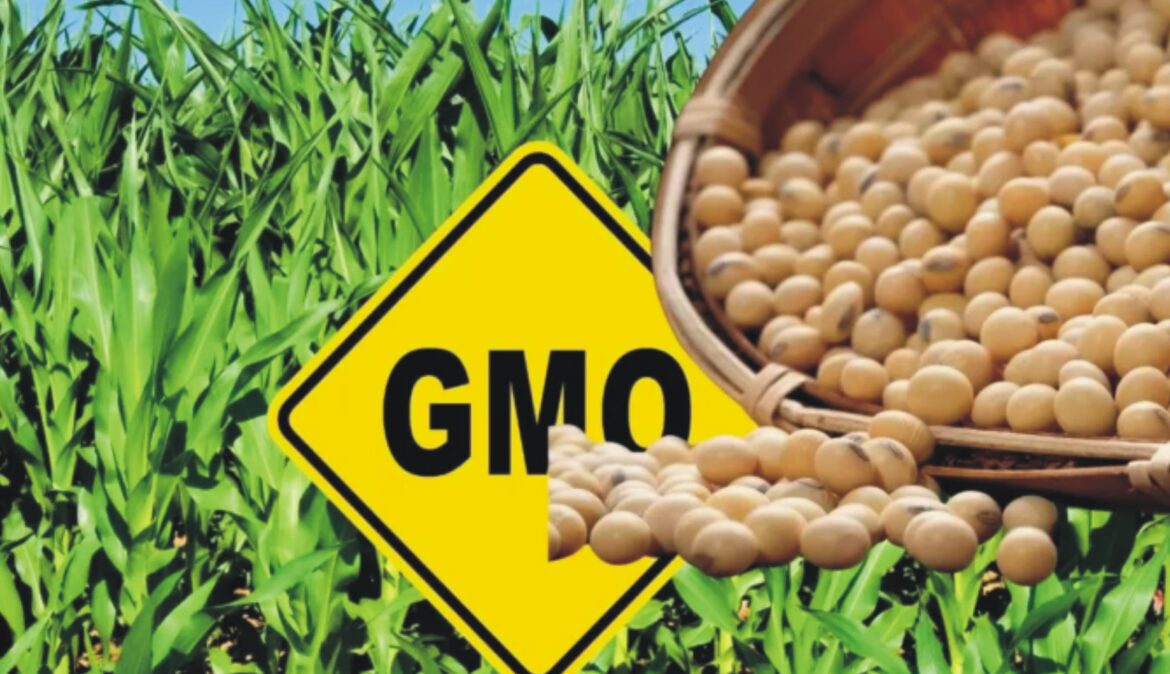STAFF REPORT
ISLAMABAD: In a surprising development, Mian Shehbaz Sharif led Federal Government has permitted the import of genetically modified (GMO) soybeans from the United States without conducting risk assessment of 47 gene-events in local conditions of Pakistan in accordance with Annexure-III read with Article 15 of the Cartagena Protocol and converted non-GMO status of the country into GMO status even after constant refusals by the previous Mian Nawaz Sharif, Mr. Shahid Khan Abassi, Mr. Imran Khan and Mian Shehbaz Sharif PDM led governments and dissneting note of Ministry of National Food Security and Research for not permitting GMO soybean in Pakistan exempting risk assessment procedure in local conditions of Pakistan. This decision, reportedly influenced by powerful industry players including Mr. Salman Shehbaz as one of the importer of US GMO Soybean and US embassy pressure, has sparked widespread concerns among environmentalists, farmers, civil society, consumers and agricultural experts.
The National Biosafety Committee under Ministry of Climate Change headed by Secretary, Mr. Eazaz A. Dar, has recently approved licenses in favour of 42 soybean importers against 47 gene-events of GMO soybean for import in Pakistan for food, feed and processing (FFP), bypassing the risk assessment procedures in local conditions of Pakistan mandated by natioal and international guidelines just on the basis of fabricated risk assessment data submitted by Dr. Mazhar Iqbal, Professor, Department of Enviornmental Sciences, Quaid-i-Azam University Islamabad receiving 0.8 million rupees from each importers. Critics allege that the authorization process was marred by irregularities, with particular concerns regarding the role of high-ranking officials in fast-tracking these approvals.
Background and Regulatory Concerns:
The Director General of the Pakistan Environmental Protection Agency (Pak-EPA), Dr. Farzana Altaf Shah, has historically been proponent for strict adherence to the Rule 14(2) of the Pakistan Biosafety Rules, that requires comprehensive risk assessment and establishment of risk management in local conditions of Pakistan before GMO products can enter and release in the country deliberately and considering deliberate release of GMO food destructive to human health, biodiversity, local agriculture and environment. According to the Cartagena Protocol, such assessments are crucial to ensure GMO imports are safe to human health and environment and do not harm local biodiversity and agriculture.
However, recent amendments in the rules—especially Rules 8, 14, and 20 of the Pakistan Biosafety Rules, 2005—have eased these requirements, allowing risk assessments based on international data rather than local studies. This sudden regulatory shift was initiated and orchestrated in urgency by Dr. Farzana Altaf Shah as Director General, Pak-EPA against her earlier stance available on record in a serious breach of trust and authority, during caretaker government without approval of Technical Advisory Committee (TAC) and National Biosafety Committee (NBC).
Unfortunately, the illegal and unconstitutional Cabinet Committee for Disposal of Legislative Cases (CCLC) constituted by the caretaker government in utter violation of the scheme of the Constitution and section 230, Election Act, 2017 approved these amendments in routine that led to promulgation of statutory regulatory order (SRO No. 45(1)/2024, dated January 18, 2024), by the Caretaker Federal Government, bypassing local environmental safeguards, exposing the country to potential ecological and health risks.
Section 230 specifies that a caretaker government is primarily responsible for overseeing the day-to-day running of the government and ensuring free and fair elections. It does not have the authority to make major policy decisions, particularly those that have long-term implications for agricultural policy and public health.
Allegations of Misconduct and Foreign Influence:
It is alleged that Dr. Farzana Altaf Shah, Director General and Dr. Zaigham Abbas Director (Lab/NEQS) the Pak-EPA may have been influenced by personal incentives, including financial inducements and promises of U.S. visas. The U.S. Embassy, along with influential groups like the All Pakistan Solvent Extraction Association (APSEA), allegedly played a pivotal role in the regulatory changes, allegedly distributing handsome sweetners among relevant ministries to ensure the amendments were passed.
Following the regulatory shift, Dr. Farzana Altaf Shah convened the 27th meeting of the Technical Advisory Committee (TAC) and presented revised Standard Operating Procedures (SOPs) for GMO imports, which were swiftly approved. Under the new guidelines, importers / developers are permitted to apply for licenses to import GMO’s for food, feed and process (FFP) in Pakistan via Institutional Biosafety Committee (IBC). Reportedly, Dr. Farzana Altaf Shah notified 30 IBC’s, 18 IBC’s from public institutions / universities/ colleges and 12 from private companies and most of private companies are devoid of requisite biotechnology related facilities, instrastructure, equipments and technical expertise, research, diagnostic and clinical work for some vested interest.
Under revised SOP / handout, Dr. Farzana Altaf Shah, Director General, Pak-EPA as Chairperson of TAC accepted, considered, approved and placed more than 40 applications from the importers for grant of licenses to import GMO Soybean having 47 gene events in Pakistan from USA that were processed, evaluated and submitted only through Dr. Zafar Iqbal, Professor, Department of Environmental Sciences, Quaid-i-Azam University, Islamabad despite the facts that these risk assessment studies of 47 gene events of GMO Soybean attached with the application of more than 42 importers do not include signatures and approvals from all members of QAU-IBC i.e., head of QAU-Department of Environmental Sciences, QAU-Dean of Social Sciences, member from Department of Economics, representative from social society that are mandatory under Rule 8 of Pakistan Biosafety Rules, 2005. Insider also revealed that the studies includes signature of only Professor Dr. Mazhar Iqbal that has been Ph.D. supervisor of Dr. Farzana Altaf Shah. Surprisingly, no application was processed, evaluated and submitted through other 29 IBC’s because other IBC’s were not ready to compromise the process and protocols of the risk assessment studies as desired by the importers and they have also doubts that their studies would not be considered, accepted and approved by Dr. Farzana Altaf Shah.
Concerns over these rushed approvals are further heightened by reports that some 42 importers, with support from Dr. Mazhar Iqbal from Quaid-i-Azam University, submitted applications to TAC using questionable data. This rapid turnaround of risk assessments, typically requiring years of detailed study and could not be completed within four months, raises questions about the integrity of the process, authenticity of risk assessment data and the legitimacy of the approvals. Insiders revealed that Dr. Farzana Altaf Shah has suggested Dr. Mazhar Iqbal to show and report that you have received applications in 2022 but she forgot that she has approved revised SOP/Handout on 22-04-2024 after amendment in Rule 14 (2) of Biosafety Rules and applications are supposed to be submitted by the importers after 22-04-2024.
Additionally, sources claim that efforts to approve GMO soybean imports intensified through the involvement of multiple ministries, including the Ministry of Climate Change, Ministry of Commerce, Ministry of Foreign Affairs, Ministry of Health, Ministry of Science and Technology and MoNFSR and individuals including Dr. Salim Mohsin, Food Security Commissioner-I on look after charge having no knowledge of biotechnology, Dr. Ghulam Muhammad Ali, Chairman, Pakistan Agricultural Research Council, Muhammad Azam Khan, Director General of Federal Seed Certification and Registration in Ministry of National Food Security and Research (M/o NFSR) Islamabad on the desire of very close friend of Dr. Kosar Abdullah Malik, Ex-Caretaker Federal Minister for National Food Security and Research, Dr. Yousuf Zaffar, currently, Vice President Pakistan Central Cotton Committee and Consultant of All Pakistan Solvent Extraction Association (APSEA) and current Coordinator to the Prime Minister on Climate Change & Environmental Coordination, Ms Romina Khurshid Alam.
Quite unfortunately, these all authorities were neither members of the Technical Advisory Committee (TAC) constituted under Rule 6 of Pakistan Biosafety Rules nor of the National Biosafety Committee (NBC) constituted under Rule 4 of the Pakistan Biosafety Rules that are authtorized to review rules and recommend to the federal government for any amendment in biosafety regulations
Implications for Pakistan’s Agriculture and Trade:
The import of GMO soybeans without adequate risk assessments risks exposing Pakistan’s agricultural sector to environmental hazards and public health issues, such as toxicity, allergic reactions, and potential antibiotic resistance. Further, GMO crops could impact Pakistan’s export markets, particularly to countries with strict non-GMO import regulations by contaminating rice, wheat, corn, etc.
Local farmers, facing potential repercussions on crop diversity and soil health, are expected to voice their opposition. Reports indicate that protests may follow if a government investigation is not initiated to scrutinize the decision-making process behind these regulatory amendments.
Agricultural stakeholders and environmental advocates are calling for a transparent inquiry into the recent approvals, urging the formation of a government investigation Joint Investigation Task Force (JIT) to address alleged regulatory violations and potential conflicts of interest among officials involved in the decision. Additionally, critics argue that the caretaker government, under the Election Act 2017, may have overstepped its mandate by enacting policy changes that previous elected governments had consistently avoided.


